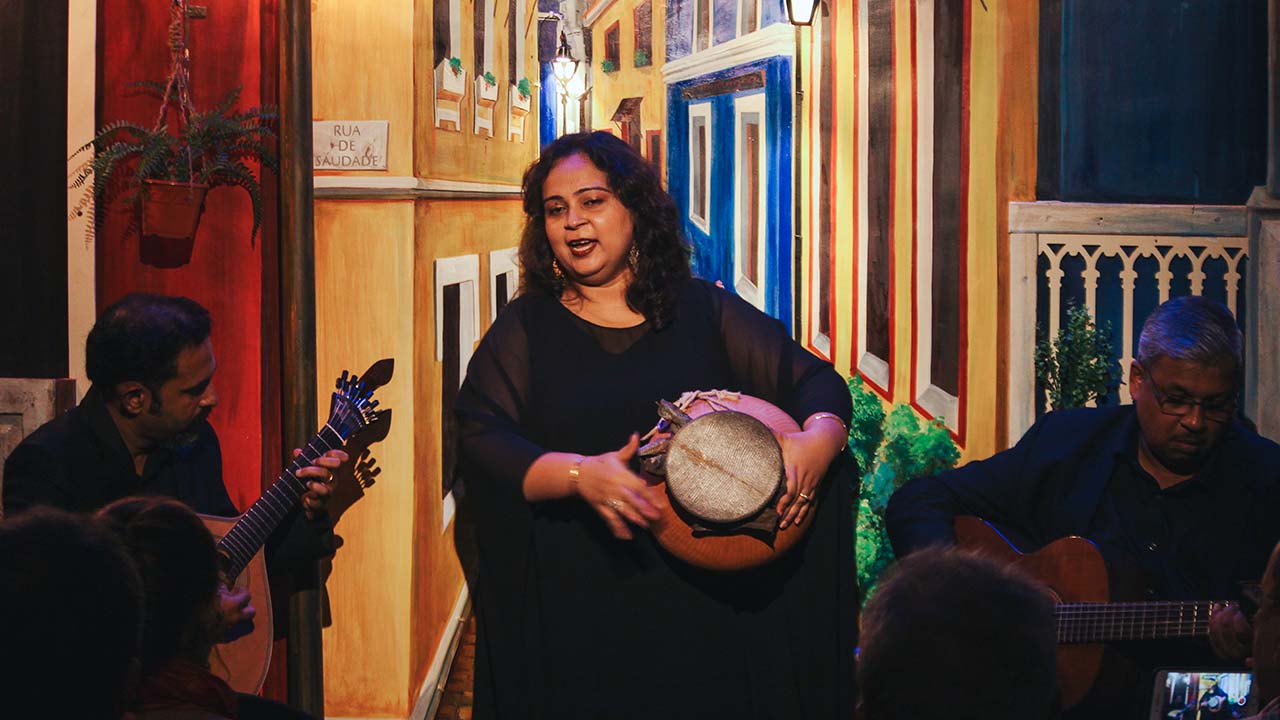From now on this line is gonna be on the lips of music aficionados: ‘I was at Madragoa yesterday…’
Madragoa is a popular ward of Lisbon, close to the mouth of the Tagus. They say it’s named after the Madres of Goa (the Monica Sisters of the old city of Goa) who’d invested in real estate there. Except that the ‘Madragoa’ here is not the well-heeled quarter of lovely Lisboa but a music set-up at the Centre for Indo-Portuguese Arts (CIPA) in pretty Panjim! And at Goa’s Madragoa there’s fado and mandó!
The fado and the mandó are two delightful musical genres. Interestingly, both were born in the nineteenth century, one in the dockyards of Lisbon, and the other in the salons of Salcete. Did the twain ever meet? Yes, they did – here in Goa. It is not so well known that the venerable Tipografia Rangel has to its credit the publication of one of the earliest pages of the fado in Goa… But let’s leave that for another day.
Yesterday was the premiere of the world’s first fado and mandó house. Madragoa – Casa do Fado e Mandó (House of Fado and Mando) opened not to a trumpet blast but to the exquisite strumming of two guitars and the thump of the ghumot, the Goan percussion instrument par excellence. The instrumentalists were none other than Orlando de Noronha (Portuguese guitar) and Carlos Meneses (fado guitar), accompanists to one of India’s most gorgeous vocalists: Sonia Shirsat, who – surprise of surprises – doubled as a ghumot player.
It is not so well known that the venerable Tipografia Rangel has to its credit the publication of one of the earliest pages of the fado in Goa… But let’s leave that for another day.
The show began, very appropriately, with an instrumental fado titled ‘Madragoa’, composed by Orlando de Noronha, who conceived the idea of the house. It was followed up with a charming repertoire of fado and mandó: ‘Rua do Capelão’, ‘Não rias’, ‘Sogllem mhojem vidu’ and ‘Lisboa, não sejas francesa’ in the first half. The second half featured ‘Lágrima’, ‘Fala da mulher sozinha’, and two inevitable numbers, ‘Casa Portuguesa’ and ‘Adeus korcho vellu pavlo’. Earlier, they played Portuguese guitarist José Nunes’ ‘Rapsódia’, once upon a time the signature tune of Renascença (All India Radio, Panjim’s weekly programme in Portuguese), bringing back memories of the seventies, eighties and nineties.
Pleasant memories were what the spectators were found exchanging during the brief intermission, while they relished Indo-Portuguese delicacies served with love: pãezinhos com chouriço do Reino, rissóis de camarão, fofos de bacalhau, croquetes, torradinhas com patê and pastéis de nata. And they got to leisurely sip a glass of sangria as well.
The perceptive audience carried home aural images of the fado and the mandó. Then, on social media and elsewhere, they shared the joys of Indo-Portuguese culture with friends and family, saying, ‘Ontem estive na Madragoa!’
But men and women do not live by bread alone. What they equally lapped up at Madragoa was the ambience. The backdrop to the fado and mandó room is a large mural depicting a mix of Panjim, Lisbon and Coimbra cityscapes. A narrow street called Rua da Saudade; row houses painted in blue, white, yellow and red; a chapel at the end of the street; and a clock tower overseeing the goings-on in the lyrical neighbourhood.
The perceptive audience carried home aural images of the fado and the mandó. Then, on social media and elsewhere, they shared the joys of Indo-Portuguese culture with friends and family, saying, ‘Ontem estive na Madragoa!’

Muitos parabéns por esta iniciativa tão interessante!
Muito obrigado pelas suas palavras de apreço. ☺️
Well written
Please tell me this performance was recorded and if it is available on YouTube. The nightingale Sonia playing ghumott whilst singing is something I have to see and hear! Kudos to Orlande for the visionary concept of Madragoa and to Carlos as well; spell binding write-up, senhor
Some videos have been making the rounds on Facebook. Do visit Madragoa when you have the time, Chris! Thanks a lot.
Thank you, Sushila! ☺️
Caríssimo Oscar, muitos Parabéns por esta excelente iniciativa e também pela bela crónica do evento. Um abraço
Obrigado, meu caro! Conto ver-te quando vieres a Goa de férias, Rui Manuel. Forte abraço.
Always so pleasing to read what you wrote. Love your unique style, you covey little bits of information while delighting the reader with your fluent writing.
Thank you for believing without seeing it, Maria Ana! But you have to make it to Madragoa. You’re always welcome.
Well written! Enjoying the flow Of your writing. Nice informative article.
Talbert, welcome to MADRAGOA!